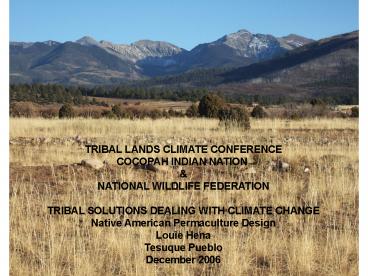TRIBAL LANDS CLIMATE CONFERENCE - PowerPoint PPT Presentation
1 / 18
Title: TRIBAL LANDS CLIMATE CONFERENCE
1
TRIBAL LANDS CLIMATE CONFERENCE COCOPAH INDIAN
NATION NATIONAL WILDLIFE FEDERATION TRIBAL
SOLUTIONS DEALING WITH CLIMATE CHANGE Native
American Permaculture Design Louie Hena Tesuque
Pueblo December 2006
2
Native American Permaculture DesignIndigenous
Solutions for a Sustainable Future
- Permanent Culture is the conscious design and
maintenance of productive ecosystems which have
the diversity, stability, and resilience. It is
the harmonious integration of landscape and
people, providing food, energy, shelter, and
other material and non-material needs in a
sustainable way. - Permaculture is a holistic approach based on
traditional practicesas a tool for improving air
quality, water quality, health, and ecosystems. - The philosophy behind Permaculture is one of
- working with nature rather than against it
- of protracted and thoughtful observation rather
- than thoughtless action of looking at systems
- to evolve beneficially, on their own way, towards
- a state of maximum natural productivity and
- abundance.
- Permaculture Ethics Respect, Care, and Share
3
RESPECT includes living and nonliving things
such as animals, plants, land water and air.
4
Care of the People to promote self reliance and
community responsibility.
Water quality training.
Alternative Energy
Community awareness of exposure pathways.
5
SHARING
6
Community Composition
7
Turning data into useful information
- Fall 1999
- Checklist of Plant Species
- TREES
- SCIENTIFIC NAME COMMON NAME FAMILY
- Abies concolor (Gord. . Glend.) Lindl. Ex
Hildbr. White fir Pinaceae - Acer negundo L. Box elder Aceraceae
- Alnus incana ssp. tenuifolia (Nutt.)
Breitung Thin leaf alder Simaroubaceae - Juniperus monosperma (Engelm.) Sarg. One seed
juniper Cupressaceae - Juniperus scopulorum Sarg. Rocky Mtn.
Juniper Cupressaceae - Pinus edulis Engelm. Pinyon Pine Pinaceae
- Pinus ponderosa P. C. Lawson Ponderosa
Pine Pinaceae - Prunus americana Marsh. Wild Plum Rosaceae
- Prunus virginiana var. melanocarpa (A. Nels.)
Sarg. Black Chokecherry Rosaceae - Quercus gambelii Nutt. Gambels Oak Fagaceae
- Salix exigua Nutt Coyote willow/sandbar
willow Salicaceae
8
Differences Between Governments
- If you look at Indian culture, you start with
the same idea that "there once was a small group
in nature...and this group recognized the value
of relatives. So they said 'We're going to have a
society of responsibility. In order to belong to
this tribe you have to do certain things. You
have to treat your relatives a certain way, you
have to treat society at large a certain way. You
have to feed the poor, you have to take care of
the orphans, and provide for the elders.
Vine Deloria
9
We are related to all things around us.
10
(No Transcript)
11
(No Transcript)
12
(No Transcript)
13
Our Way of Life
14
Water control systems in the Mesa Verde area were
designated as National Historic Civil Engineering
Landmarks in 2004 by the American Society of
Civil Engineers.
Rock gabion w/splash guard and irrigation line.
15
Less CO2 in the atmosphere - Increased soil
organic matter - Improved soil quality
and productivity - Reduced soil erosion -
Improved water quality - Reduced sediment and
nutrient loads in our streams, lakes and rivers
- Improved water efficiency - Improved wildlife
habitat - Greater soil bio-diversity - i.e.
beneficial microbes and macrobes
16
The Indigenous Food Seed Sovereignty Alliance
Mission Statement To continue, revive, and
protect our native seeds, crops, heritage fruits,
animals, wild plants, traditions, and knowledge
of our indigenous, land- and acequia- based
communities in New Mexico for the purpose of
maintaining and continuing our cultural integrity
and resisting the global, industrialized food
system that can corrupt our lives, freedom, and
culture through inappropriate food production
and genetic engineering. SEED SOVERIGNTY
DECLARATION New Mexico Acequia Association and
Traditional Native American Farmers
Association Resolutions passed by Eight Northern
Pueblos Council the All Indian Pueblos
Council Resolution passed by National Congress of
American Indians An Alliance comprised of the
New Mexico Acequia Association and its member
acequia farmers and ranchers, the Traditional
Native American Farmers Association, youth
farmers, and concerned citizens. A petition to
protect native seeds and address issues around
Genetically Engineered foods We, the undersigned
citizens, oppose the use of genetically
engineered (GE) crops in agriculture. We are
concerned about the deleterious and unknown
health effects to people, wild-, and plant life.
Further, we strongly feel that the potential GE
contamination to native, local, open-pollinated
seeds that have been maintained by indigenous
people and conscientious farmers for millennia
is unacceptable. We also call upon our local,
State, and Federal governments to create zones
free of GE agriculture as well as to require
labeling for food products that contain GE
ingredients.
17
The overall goal is to have a clean, safe and
healthy environment for our children to enjoy.
18
(No Transcript)































